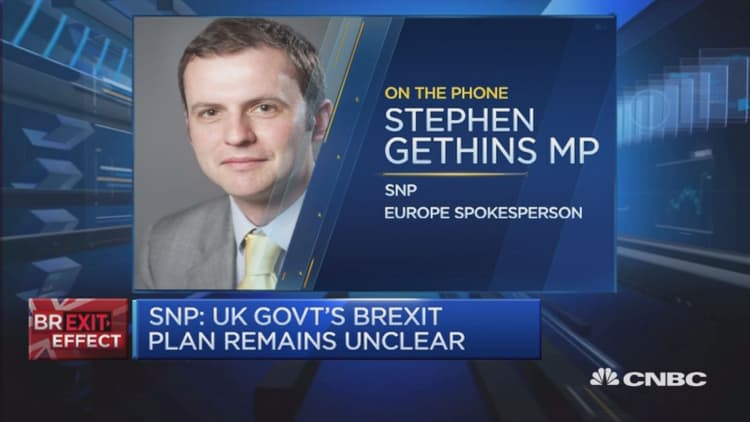The euro zone economy accelerated marginally in August, according to Markit's euro zone composite purchasing managers' index (PMI), which came in at a seven-month high.
The flash reading, out on Tuesday, came in at 53.3, up on 53.2 in July.
"The August flash PMI indicates the euro zone remains on a steady growth path in the third quarter, with no signs of the recovery being derailed by 'Brexit' uncertainty," Chris Williamson, chief business economist at IHS Markit, said in a report on Tuesday.

He said the PMI data was consistent with economic growth in the 19-country euro zone averaging 0.3 percent in the third quarter, quarter-on-quarter, or 1.2 percent annualized. That would be similar to growth seen in the first half of the year.
"While the resilience of the PMI in August will add to the belief the European Central Bank (ECB) will see no need for any immediate further stimulus, the weakness of the overall pace of expansion and disappointing trends in hiring, order books, business optimism and prices all suggest that policymakers will keep the door open for more stimulus later in the year," Williamson said.
The euro zone composite index read 53.2 in July, marginally up on 53.1 on June.
Euro zone economic data has been in heightened focus since the U.K.'s vote to leave the European Union on June 23, which is seen knocking confidence in neighboring countries.
So far, evidence has been mixed. Euro area annual inflation crept higher to 0.2 percent in July from 0.1 percent in June, according to official data from the European Commission. Other major data out, such as second-quarter economic growth from the European Commission, have covered little of the period after the referendum so provide little indication of any hit.

"The fact that the euro zone PMI has not fallen in the two months following the U.K.'s Brexit vote will be welcome news for policymakers. But growth remains too sluggish to push core inflation back to the ECB's target," Stephen Brown, European economist at Capital Economics, said in a report published after the PMI data.
With that in mind, Capital Economics reiterated its forecast that the ECB will increase monetary support after the next policy meeting in September. It sees the central bank increasing its asset-purchasing program to 90 billion euros ($102 billion) from 80 billion euro per month and extending the program by six months to September 2017.
German private sector activity slowed to a two-month low of 54.4 in August, down from 55.3 in July, according to the Markit index on Tuesday. Readings over 50 signal economic expansion, but the declining numbers suggest growth is slowing.
"Output, new orders and employment all rose at slightly weaker rates during the month, thereby signalling that business conditions have become a bit more challenging since the prior month," Oliver Kolodseike, economist at IHS Markit, said in a report on Tuesday.
Meanwhile, French private sector output hit a 10-month high in August, with the Markit flash French composite output index at 51.6.
"France's private sector economy gathered some momentum in August, raising hopes of a pick-up in GDP growth after the stagnation seen in the second quarter. A stronger contribution from the service sector bolstered overall output, while manufacturing held its ground to halt a recent slide," Jack Kennedy, senior economist at IHS Markit, said in a report on Tuesday.
"That said, the trend in incoming new business remains muted while firms indicated a return to job shedding in the latest month, suggesting that the recovery remains stuck in the slow lane," he added.

